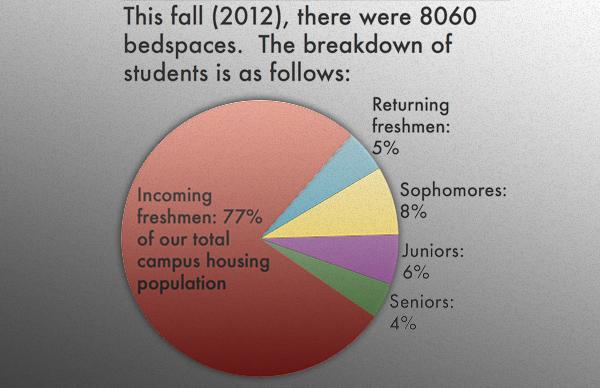The University of Alabama’s student population is growing every year, but the University will offer on-campus housing to 260 less students next year.
Approximately 7,800 beds will be available next year, Alicia Browne, the director of housing administration, said. This year, 8,060 spaces were.
Browne explained that incoming freshman students get first priority when it comes to campus housing determination and placement.
“The University of Alabama recognizes a special responsibility to incoming freshmen, and part of our commitment to giving students the best start is to provide on-campus housing,” Browne said, “which helps students become engaged in campus life during their crucial first year.”
After all incoming freshman are placed, priority for housing is then reserved to those students with housing scholarships, because their scholarship money can only be applied to on-campus options, Browne said.
From here, housing priority falls by class, accommodating first the rising sophomores, then juniors and finally seniors.
This year’s campus housing population was made of approximately 77 percent incoming freshmen, 5 percent returning freshmen, 8 percent sophomores, 6 percent juniors and 4 percent seniors.
Browne also highlighted that not all residential experiences are the same. Students looking for a more selective dorm experience can look to Living-Learning Communities on campus for other residential options.
“There are over 2,000 spaces in Living-Learning Communities on campus,” Browne said. “The application and selection process varies, depending on community.”
For Honors Housing, a student must be a member of the Honors College, while other programs have an application process, such as the Mallet Assembly and three language houses.
“We try to accommodate as many students as possible, and we maintain a waiting list of students so that we can go back to as many as possible if we find that more housing is available than we initially anticipated,” she said.
Tyler Rigdon, a senior majoring in marketing, said living on campus throughout his junior year at the University was an overall great experience, despite what most students might hear.
“It was never harder to secure housing past my freshman year,” Rigdon said. “Living on campus was convenient for my classes and extra-curricular organizations; however, the only downfall is that most of my friends lived off campus and were not too motivated to come back to the dorms.”
Rigdon also encouraged other students who are interested in living on campus for consecutive years to find friends with which to share a suite or hall.
“The main reason I enjoyed living on campus for multiple years was that I knew a majority of people who I shared a suite or hall during my sophomore and junior years,” he said.
Most students choose to live off campus after their freshman or sophomore year for several different reasons.
“We recognize that as students get further along in their college careers and are getting closer to graduation and moving off campus, they have developed skills to help them make good decisions that will guide them in moving off campus,” Browne said.
This proved true for students like Lexie SoloRio, a junior majoring in math, who said moving off campus was the next step in gaining more independence while in college.
“I loved my dorm freshman year,” SoloRio said. “But there is something about maintaining your own apartment off campus that gives you a sense of independence, and that’s the first time you really get that feeling.”









